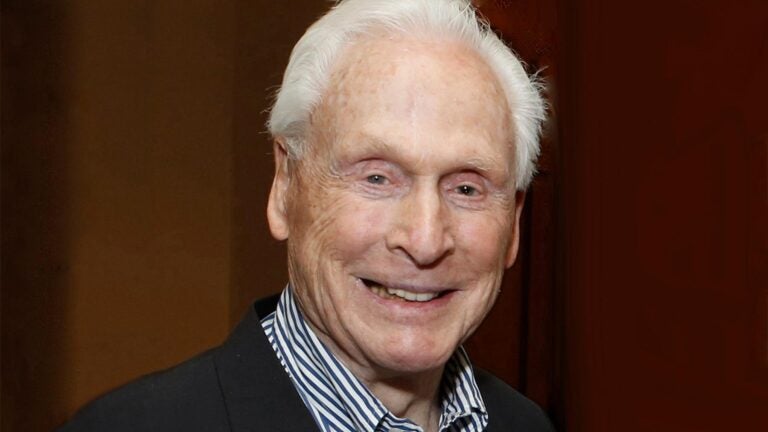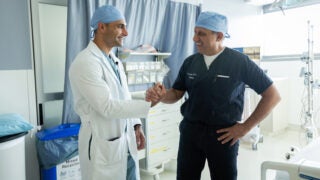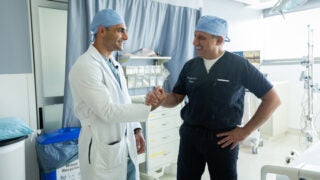
Malcolm Currie joined the USC Board of Trustees in 1989 and served as its chairman from 1995 to 2000. (Photo/Courtesy of the Currie Family)
Aerospace industry pioneer and USC Trustee Malcolm Currie, 94
His esteemed career in electronics and weapons research and development included serving as undersecretary of defense research and engineering in the Department of Defense.
USC Trustee Malcolm Currie, engineering physicist and former chairman and CEO of Hughes Aircraft Co., died on April 18. He was 94.
A defense and aerospace industry leader, Currie was best known for his work at the helm of Hughes Aircraft, a post he held from 1988 to 1993 in the wake of the defense contractor’s acquisition by General Motors. His distinguished career in electronics and weapons research and development included public service as undersecretary of defense research and engineering in the U.S. Department of Defense. He also served as national armaments director.
As a member of the USC Board of Trustees since 1989 and its chairman from 1995 to 2000, Currie oversaw a period of growth and success at USC that included the near-doubling of the university’s endowment and its selection by the Time/Princeton Review College Guide as College of the Year in 2000. In honor of his service to USC, Currie received the university’s highest honor, the Presidential Medallion, in 2001.
“Mal Currie was a remarkable engineer and innovator with a tremendously entrepreneurial spirit,” USC President Carol L. Folt said. “The support that he and his wife, Barbara, have shown to USC’s medical research and education endeavors have furthered the university’s work in areas critical to our growth and have contributed to advances in technology and biomedical research.”
Mal Currie was a remarkable engineer and innovator with a tremendously entrepreneurial spirit.
President Carol L. Folt
Currie enlisted in the Navy during World War II, but the war ended before he could complete flight training. He took a discharge to earn his bachelor’s degree in physics and doctoral degree in engineering physics from the University of California, Berkeley. He began his career as a research scientist at Hughes in 1954, quickly rising to director of the company’s research and development engineering division. There, he oversaw projects such as the first digital airborne radars, laser systems and early satellite communications electronics.
Many in the scientific and aerospace communities took note of his achievements. Among them was renowned scientific instrument inventor Arnold Beckman, who recruited Currie from Hughes to head research and development for his company Beckman Instruments, a biomedical product developer and manufacturer.
Currie’s abilities and accomplishments soon earned him another honor, this one from the federal government. Barely two years after joining Beckman, Currie was appointed undersecretary of defense research and engineering in 1973, making him responsible for planning, managing and guiding the defense department’s weapons research, development and acquisition programs. In his concurrent role as national armaments director, he started and guided pioneering programs on the global positioning system and cruise missiles.
Four years later, he returned to Hughes and steadily rose through its ranks to become chairman and CEO. He led Hughes for five years until his mandatory retirement at age 65 in 1993. He is credited with leading its strategic diversification from defense into such areas as commercial satellite communications and private business network products.
Not one to rest in retirement, he founded Currie Technologies, a developer and distributor of electric bikes and scooters, demonstrating his confidence in what he told The Wall Street Journal in 2000 was “the coming electric revolution.”
Malcolm Currie: a man of many accolades, devoted to USC
Over the years, Currie gifted USC with $12.1 million.
That includes a 2015 donation of $10 million toward the endowment of the Keck School of Medicine of USC and the construction of the USC Michelson Center for Convergent Bioscience. In recognition of the couple’s investment in the university’s biomedical research and education, a new Health Sciences Campus residence hall that opened in 2016 was named the Malcolm and Barbara Currie Residence Hall.
Their generosity to USC also includes the 2008 endowment of the Malcolm R. Currie Chair in Technology and the Humanities. It was USC’s first endowed faculty position honoring exceptional achievements in both realms.
In an interview at the time, Currie said that he and his wife, Barbara, sought to establish a chair that could “recognize that many of our most effective leaders of the future will have a depth of understanding of the technologies that are changing our world as well as the breadth of vision and perspective that come from study and love of the humanities.”
Currie was a member of the National Academy of Engineering, a fellow of the Institute of Electrical and Electronic Engineers and president of the American Institute of Aeronautics and Astronautics. He held many patents and published numerous papers on topics from lasers to space propulsion.
He was a recipient of the U.S. Department of Defense’s Distinguished Public Service Medal, the NASA Distinguished Service Medal, the National Intelligence Medal, the Goddard Astronautics Award, the Air Force Thomas D. White National Defense Award, the IEEE Founders Medal and the American Electronics Association National Achievement Award. Currie also held the rank of Commander in the French Legion of Honor and was inducted into the Space Technology Hall of Fame in 1998 for his work on the global positioning system.
He also shared with his wife a love for rare horse breeds. For three decades, the couple studied horse breeding history and bloodlines and visited farms around the world to import, breed and raise Pure Spanish Horses on their ranch in Agoura Hills, Calif.
He is survived by his wife, Barbara; children Deborah, David and Diana; and two grandchildren.



